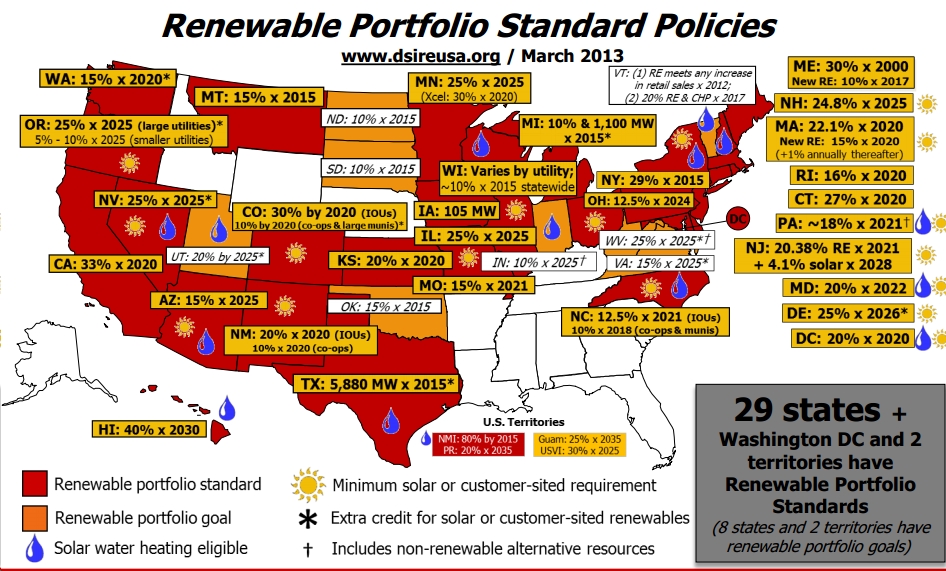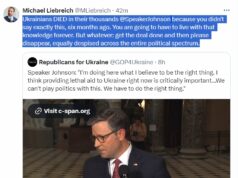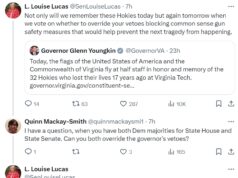 This blog posting represents the first in a debate series developed by authors of Bacon’s Rebellion and Blue Virginia on actions that Virginians can take to address climate change. All articles will be simultaneously posted on both blogs.
This blog posting represents the first in a debate series developed by authors of Bacon’s Rebellion and Blue Virginia on actions that Virginians can take to address climate change. All articles will be simultaneously posted on both blogs.
Introduction. Renewable Portfolio Standards (RPS) are laws or regulations designed to increase the percentage of energy made from renewable sources. This change is intended to reduce pollution including the CO2 emissions responsible for global climate change. Renewable portfolio standards are usually directed at electrical generation companies. RPS regulations vary from state to state. There are no federal RPS rules.
A typical RPS specifies a percentage of electricity in a state that will be generated from renewable sources by some time in the future. For example, California has an RPS of 33% of its electricity generated by renewable inputs by 2020. Renewable portfolio standards may be either mandatory standards or voluntary goals.
Presently, 29 US states have mandatory RPSs. Eight states have voluntary RPS goals. Thirteen states have no RPS regulation.
Virginia is among the eight states that have adopted voluntary RPS goals. The Commonwealth has set an RPS goal to generate 15% of the state’s electricity from renewable sources by 2025. This goal is one of the least ambitious among the 37 states that have RPS standards or goals.
RPS regulations are controversial. In the recent Virginia governor’s race Terry McAuliffe supported a move to make Virginia’s RPS mandatory and to increase the percentage of electricity produced from renewable sources from 15% to 25%. Ken Cuccinelli opposed McAuliffe’s plan claiming that mandatory RPS legislation would raise electricity prices and eliminate jobs. However, both Ken Cuccinelli and Virginia environmental groups agree that the existing RPS legislation has been ineffective.
The question before the debaters is this: Should Virginia make its RPS standard mandatory?
Yes – Leading Virginia to a Clean Energy Future
Lowell Feld and “Kindler,” Blue Virginia
The U.S. government is at its most effective when it sets big, forward-looking goals for society – sending a man to the moon, overcoming the Great Depression, eliminating slavery, creating the national parks system. In each of these cases, we could have said: “no problem, the free market will take care of it!” But that wouldn’t have gotten the job done, and all of us would have been worse off as a result.
The ongoing battle against global climate change, caused largely by the use of fossil fuels, is a classic case of systemic “market failure” necessitating strong governmental action to correct it. In this case, most of the enormous environmental, health and social costs of fossil fuels are simply unaccounted for in their price. So fossil fuels are priced far lower than they would be if those costs were accounted for — meaning that the oil, gas and coal industries get a free lunch, while we pay for all the damage they cause.
Renewable Portfolio Standards (RPSs) are a highly effective way to begin to level the playing field in ways that make it easier for renewable energy sources to compete. But since it requires the government to take a stand, we can already hear our conservative friends saying NO: government must not interfere with the “free market,” government must not “pick winners and losers”, government screws up everything it touches, we should let the market figure it all out. So let’s just be clear on a few key points: Read more.
Yes – Fossil, Nukes Got Support, Why Not Renewables?
Peter Galuszka, Bacon’s Rebellion
Virginia is typically behind the rest of the country when it comes to addressing new problems and finding solutions. Renewable energy is yet another example.
In the middle part of the past decade, undeniable evidence of the threat of climate change became obvious across the globe. A movement began to shepherd a shift to renewable energy-sources – solar, wind, geothermal and others – by passing laws making it mandatory that utilities obtain a specific percentage of their energy from such sources by set deadlines.
Thirty states and the District of Columbia — including all of Virginia’s neighbors — joined the movement for Renewable Portfolio Standards (RPS) as have other countries, such as the United Kingdom, Poland and Belgium. True to form and genuflecting to big business interests, Virginia made its RPS voluntary. Read more.
No – How a Renewable Portfolio Standard in Virginia Will Punish Electric Customers and Erode Competitiveness
James A. Bacon, Bacon’s Rebellion
What would Henry Howell think of Virginia’s liberals and progressives today? Howell, the populist candidate whose watchword was “Keep the big boys honest,” came within a whisker’s width of defeating the conservative Mills Godwin in the 1973 race for governor. The “big boys” against whom he railed were the senior executives of Virginia’s electric power companies and their minions around the state. The 1970s were a period of soaring electricity prices, and Howell championed the cause of the little guy who saw his paycheck eroded by higher electric bills.
There is no way to know what “Howling” Henry would think of modern-day liberals and progressives if he were alive today, but there is a good chance he would be dismayed by their push for a mandatory Renewable Portfolio Standard (RPS) in Virginia. In contrast to the voluntary goal in place today, a mandatory standard would require power companies to derive a major share of their electric-generating capacity from renewable fuels such as solar, wind or biomass. The reason it is necessary to mandate the use of these power sources is that they are far more expensive than fossil fuels. Mandating an RPS would add billions of dollars to the rate base of Dominion, AEP and the smaller power companies, resulting in higher electric bills for all Virginians.
A new, multibillion-dollar industry of politically connected insiders – ethanol producers, wind generators, solar power producers, electric car manufacturers — has arisen around the renewable movement on the grounds that the United States and Virginia need to reduce fossil fuel combustion and carbon-dioxide emissions implicated in global warming. Rather than compete on the basis of cost, these rent seekers work the political system to force their uneconomic technologies upon a reluctant populace. They are the unaccountable Big Boys of the early 21st century but there is no Henry Howell to keep them honest. Read more.


 Sign up for the Blue Virginia weekly newsletter
Sign up for the Blue Virginia weekly newsletter








![Sen. Mark Warner: “The best time to [pass aid to Ukraine] would have been months ago. The second best time is right now.”](https://bluevirginia.us/wp-content/uploads/2023/02/warner0207-100x75.jpg)